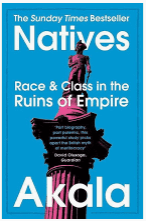'Race and Class in the Ruins of Empire'
Research questions before listening:
How does the legacy of empire affect race and class in British society?
What is the future of race and class in British society? Will it be more homogeneous?
You can access the recording here, through BBC Sounds:
https://www.bbc.co.uk/sounds/play/p067g765
Summary
- This talk discusses policies towards slave trading in the Brtish empire, and
how genocide was viewed as being preferable to the emancipation of slaves.
- The speaker asks: why do we hold the Japanese or Germans
accountable for attempted genocide in the second world war and not the British Empire for the way they treated slaves?
- history is subjective and can be manipulated
according to what people want us to hear.
- if this information were included in school
curricula, it would make history more interesting for many people, and would
help them to understand that anyone can be guilty of
discrimination and treating others unfairly.
Possible future research questions:
Will slavery under the British Empire be included in school books in the future?
Why do countries whitewash their own misdeeds in the past?

